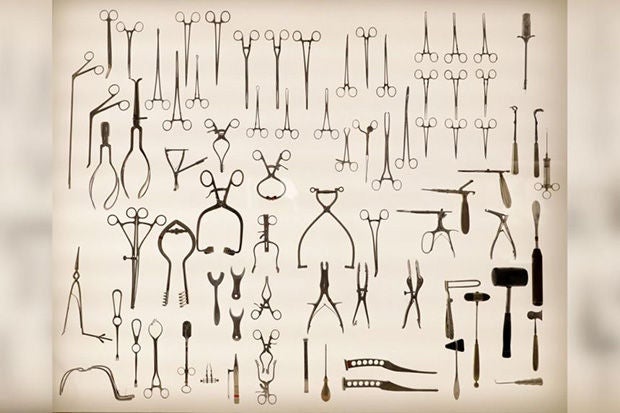
The collection includes obstetric delivery forceps used by doctors, self-retaining retractors, bone-nibbler clamps, mallots, curettes, bone hooks, osteotome, rongeurs, and a little axe saw used to cut parts of the skull. Some of these surgical instruments were used in ground-breaking procedures by doctors at Singapore General Hospital to preserve organs or limbs and save lives. Today, they have been replaced by new and more effective instruments. ST PHOTO: NEO XIAOBI
As Singapore General Hospital celebrates its bicentennial year, museum artefacts from the oldest hospital here offer insights into the growth of public healthcare in Singapore.
Singapore General Hospital (SGH) had humble beginnings in 1821, when a wooden shed was set up in the British military camp near Bras Basah and Stamford roads to cater to injured European soldiers.
Rebuilt a few times at different locations over the next few decades, the hospital's modern history began with the opening of 800 beds in the Bowyer, Stanley and Norris blocks in 1926, when it became a public medical institution open to locals.
Today, only the Bowyer Block - with its distinctive clock tower - remains. The iconic block was gazetted as a national monument in 2009 and is where the revamped SGH museum, which is slated to open by the end of the month with a new experiential design, is located.
Collected from donations and archives, the artefacts in the museum allow visitors to learn about the origins of the hospital, which also marked the birth of medicine in Singapore, and its development into one of the 10 best hospitals in the world, according to Newsweek magazine's annual ranking of the world's best hospitals last year.
The exhibition is co-curated by SGH and the Preservation of Sites and Monuments under the National Heritage Board.
The Straits Times features some interesting artefacts from the hospital's museum and its mini gallery - such as wooden bed blocks used in the orthopaedic wards to elevate patients' beds in the 1960s, protective goggles in the physiotherapy department to protect patients' eyes during microwave therapy, stainless steel sterilising drums, and a halo-designed face shield used in the 1980s - to understand medical development and the impact on the people and community over the past 200 years.
Contributed by














 Get it on Google Play
Get it on Google Play